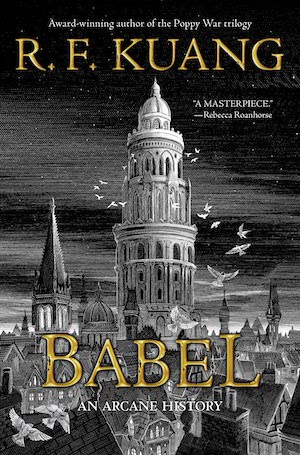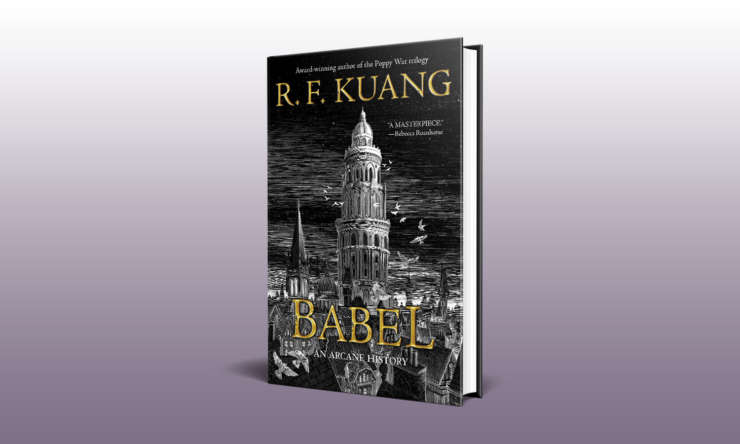Traduttore, traditore: An act of translation is always an act of betrayal.
We’re thrilled to share an excerpt from R.F. Kuang’s Babel, an alternate history that grapples with student revolutions, colonial resistance, and the use of language and translation as the dominating tool of the British empire—publishing August 23rd with Harper Voyager.
1828. Robin Swift, orphaned by cholera in Canton, is brought to London by the mysterious Professor Lovell. There, he trains for years in Latin, Ancient Greek, and Chinese, all in preparation for the day he’ll enroll in Oxford University’s prestigious Royal Institute of Translation—also known as Babel.
Babel is the world’s center for translation and, more importantly, magic. Silver working—the art of manifesting the meaning lost in translation using enchanted silver bars—has made the British unparalleled in power, as its knowledge serves the Empire’s quest for colonization.
For Robin, Oxford is a utopia dedicated to the pursuit of knowledge. But knowledge obeys power, and as a Chinese boy raised in Britain, Robin realizes serving Babel means betraying his motherland. As his studies progress, Robin finds himself caught between Babel and the shadowy Hermes Society, an organization dedicated to stopping imperial expansion. When Britain pursues an unjust war with China over silver and opium, Robin must decide…
Can powerful institutions be changed from within, or does revolution always require violence?
By the time Professor Richard Lovell found his way through Canton’s narrow alleys to the faded address in his diary, the boy was the only one in the house left alive.
The air was rank, the floors slippery. A jug of water sat full, untouched by the bed. At first the boy had been too scared of retching to drink; now he was too weak to lift the jug. He was still conscious, though he’d sunk into a drowsy, half-dreaming haze. Soon, he knew, he’d fall into a deep sleep and fail to wake up. That was what had happened to his grandparents a week ago, then his aunts a day after, and then Miss Betty, the Englishwoman, a day after that.
Buy the Book


Babel
His mother had perished that morning. He lay beside her body, watching as the blues and purples deepened across her skin. The last thing she’d said to him was his name, two syllables mouthed without breath. Her face had then gone slack and uneven. Her tongue lolled out of her mouth. The boy tried to close her filmy eyes, but her lids kept sliding back open.
No one answered when Professor Lovell knocked. No one exclaimed in surprise when he kicked through the front door—locked, because plague thieves were stripping the houses in the neighbourhood bare, and though there was little of value in their home, the boy and his mother had wanted a few hours of peace before the sickness took them too. The boy heard all the commotion from upstairs, but he couldn’t bring himself to care.
By then he only wanted to die.
Professor Lovell made his way up the stairs, crossed the room, and stood over the boy for a long moment. He did not notice, or chose not to notice, the dead woman on the bed. The boy lay still in his shadow, wondering if this tall, pale figure in black had come to reap his soul.
‘How do you feel?’ Professor Lovell asked.
The boy’s breathing was too laboured to answer.
Professor Lovell knelt beside the bed. He drew a slim silver bar out of his front pocket and placed it over the boy’s bare chest. The boy flinched; the metal stung like ice.
‘Triacle,’ Professor Lovell said first in French. Then, in English, ‘Treacle.’
The bar glowed a pale white. There came an eerie sound from nowhere; a ringing, a singing. The boy whined and curled onto his side, his tongue prodding confusedly around his mouth.
‘Bear with it,’ murmured Professor Lovell. ‘Swallow what you taste.’
Seconds trickled by. The boy’s breathing steadied. He opened his eyes. He saw Professor Lovell more clearly now, could make out the slategrey eyes and curved nose—yīnggōubi, they called it, a hawk’s-beak nose—that could only belong on a foreigner’s face.
‘How do you feel now?’ asked Professor Lovell.
The boy took another deep breath. Then he said, in surprisingly good English, ‘It’s sweet. It tastes so sweet…’
‘Good. That means it worked.’ Professor Lovell slipped the bar back into his pocket. ‘Is there anyone else alive here?’
‘No,’ whispered the boy. ‘Just me.’
‘Is there anything you can’t leave behind?’
The boy was silent for a moment. A fly landed on his mother’s cheek and crawled across her nose. He wanted to brush it off, but he didn’t have the strength to lift his hand.
‘I can’t take a body,’ said Professor Lovell. ‘Not where we’re going.’
The boy stared at his mother for a long moment.
‘My books,’ he said at last. ‘Under the bed.’
Professor Lovell bent beneath the bed and pulled out four thick volumes. Books written in English, spines battered from use, some pages worn so thin that the print was barely still legible. The professor flipped through them, smiling despite himself, and placed them in his bag. Then he slid his arms under the boy’s thin frame and lifted him out of the house.
In 1829, the plague that later became known as Asiatic Cholera made its way from Calcutta across the Bay of Bengal to the Far East—first to Siam, then Manila, then finally the shores of China on merchant ships whose dehydrated, sunken-eyed sailors dumped their waste into the Pearl River, contaminating the waters where thousands drank, laundered, swam, and bathed. It hit Canton like a tidal wave, rapidly working its way from the docks to the inland residential areas. The boy’s neighbourhood had succumbed within weeks, whole families perishing helplessly in their homes. When Professor Lovell carried the boy out of Canton’s alleys, everyone else on his street was already dead.
The boy learned all this when he awoke in a clean, well-lit room in the English Factory, wrapped in blankets softer and whiter than anything he’d ever touched. These only slightly reduced his discomfort. He was terribly hot, and his tongue sat in his mouth like a dense, sandy stone. He felt as though he were floating far above his body. Every time the professor spoke, sharp pangs shot through his temples, accompanied by flashes of red.
‘You’re very lucky,’ said Professor Lovell. ‘This illness kills almost everything it touches.’
The boy stared, fascinated by this foreigner’s long face and pale grey eyes. If he let his gaze drift out of focus, the foreigner morphed into a giant bird. A crow. No, a raptor. Something vicious and strong.
‘Can you understand what I’m saying?’
The boy wet his parched lips and uttered a response.
Professor Lovell shook his head. ‘English. Use your English.’
The boy’s throat burned. He coughed.
‘I know you have English.’ Professor Lovell’s voice sounded like a warning. ‘Use it.
‘My mother,’ breathed the boy. ‘You forgot my mother.’
From Babel: Or the Necessity of Violence: An Arcane History of the Oxford Translators’ Revolution by R.F. Kuang, published by Harper Voyager. Copyright © 2022 by R.F. Kuang. Reprinted courtesy of HarperCollins Publishers.











So we have a world where magic is real. And yet . . . we get an early 19th century with an imperial Britain, a weakened China, recognizably English names such as “Lovell” (which comes from Norman French and thus implies that history for Normans, France, and England, at least, unfolded in a broadly similar fashion to our history), a distribution of physical appearances that, based on a sample of two, match what we have in our magicless real world, etc.